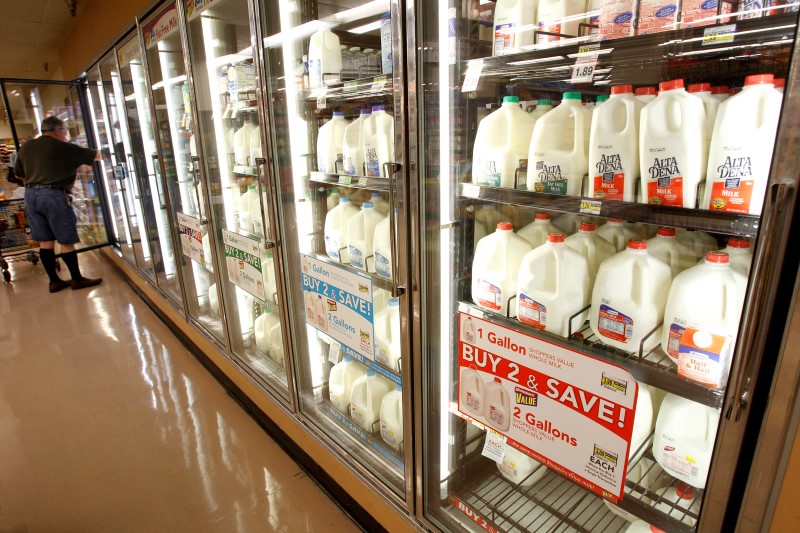Stock market today: Stocks fall as investors rotate out of tech into Jackson Hole
(Bloomberg) -- Consumers can’t seem to get enough plant-based alternatives, and Oatly Group AB, the vegan food and drink maker, is looking to cash in.
This week, as the Swedish producer of oat-based milk and dairy alternatives will finally make its highly anticipated U.S. initial public offering, investors will have to gauge not just how popular its products are now, but how much hotter they can get in a market that’s both bigger -- and more crowded -- than ever before.
“There’s a lot of competing products in the dairy alternative market. There is oats and soy, almond milk, nut-based milks. There’s quite a lot of choice out there,” said Mark Lynch, partner at Oghma Partners, a corporate finance advisory firm specializing in the food and beverage sector. Still, Oatly’s IPO “reflects the maturity and the staying power of the plant-based business. It’s also highlighting it’s not just a fad.”
Oatly, one of at least 10 initial public offerings originally expected this week in the U.S., is seeking to raise as much as $1.65 billion. It’s offering 64.7 million American depositary shares for $15 to $17 each. The company declined to comment ahead of the offering.
Beyond Comparisons
Its market value would be $10.1 billion at the top of its IPO price target, according to calculations by Bloomberg, and this would be 7.1 times its forecast 2022 revenue, according to a person familiar with the matter who asked not to be identified discussing private information. While numerous companies are focused on healthier alternatives to traditional food products, few operate as standalone public companies, making comparisons inexact.
Beyond Meat (NASDAQ:BYND), by comparison, is valued at 15.5 its revenue for the 12 months ended April 3. Snack maker Simply Good Foods Co. (NASDAQ:SMPL), another publicly traded company that advertises its products like protein bars as healthier, currently has a market value of about 3.4 times its revenue for the past year.
The IPO underscores plant-based products’ jump into the mainstream, as environmental and health concerns spur consumers to seek alternatives to traditional meat and dairy products. Investors have been looking for ways to replicate the public-market success of Beyond Meat, whose shares have surged more than 300% since it went public in May 2019. Oatly, with its multi-continental expansion plans, offers a way for institutional investors to tap booming interest in a foodtech space often dominated by venture capital and private funding.
Oatly is the number two milk-alternative brand in Western Europe, comprising about 9.2% of the market, according to an RBC Capital Markets report, citing researcher Euromonitor International. But it doesn’t even appear on the North American list of top plant-based milks, which is dominated by the likes of Danone’s Silk and Blue Diamond Growers’ Almond Breeze. Global milk alternatives generated $16.9 billion in sales in 2020, accounting for some 12% of the total milk sales, Euromonitor data show.
With plant-based demand surging, more companies are elbowing their way into the space. Nestle SA (SIX:NESN), a latecomer to the industry, is rolling out a new pea-based milk in Europe to compete with Oatly. A set of newcomers with a range of technologies are also coming for the dairy alternatives space. For instance, Halsa Foods and Yofix Probiotics Ltd. promise to offer “clean label” plant-based products made with simple ingredients, according to Maria Mascaraque, industry manager for food and nutrition at Euromonitor. PitchBook estimates that 30 new plant-based dairy companies have received a first funding round since 2004.
“Competition has been incredibly intense in the past few years. We hear that every month a new brand launches,” said Emma Letheren, an analyst at RBC, noting that those with a foothold already are in the best position. “We wonder if it’s become generally harder to compete because now major players have carved out the market; it might become harder for newcomers to gain a market share.”
Cow’s milk shouldn’t be discounted, either. It’s less expensive and it’s the incumbent. “With rare exceptions, a substitute never replaces the original,” said Nicholas Fereday, a consumer foods analyst at Rabobank.
Reported Shortages
Still, Oatly has been gaining a following, and fast. At a May 12 conference hosted by the Wall Street Journal, Starbucks Corp (NASDAQ:SBUX). Chief Executive Officer Kevin Johnson said that alternative milks like soy and almond made up 17% of U.S. beverages last year. Then it rolled out Oatly, and now roughly 25% use alternative milks.
Oatly’s biggest obstacle might be itself. Since its entrance into the U.S. market in 2017 -- first aimed toward professional baristas and then mass consumers -- finding Oatly in coffee shops and in supermarkets has become something of a treasure hunt for shoppers looking for their fix. The company opened a $15 million Millville, New Jersey, plant in 2019 to help meet the growing demand, but even now, shortages are frequent, as Covid-related delays have kept a planned second U.S. production from coming online.
In March, supermarkets across the country -- and even its new splashy customer Starbucks -- reported trouble procuring orders. To meet demand and fuel further market expansion, Oatly is also developing factories in the U.K., China and Singapore.
Other leaders in plant-based food, including Beyond Meat and Impossible Foods, experienced shortages as well when they were getting off the ground. “It signals that demand outstrips supply,” said Rachel Dreskin, chief executive officer of the Plant Based Foods Association, speaking of the recurring problems in the category. “It’s a more exciting signal than the opposite.”
©2021 Bloomberg L.P.
